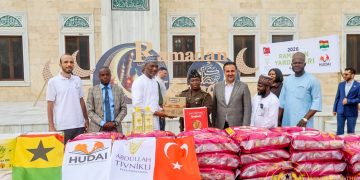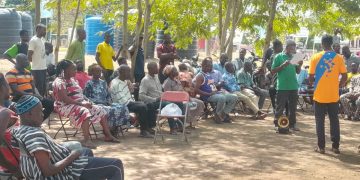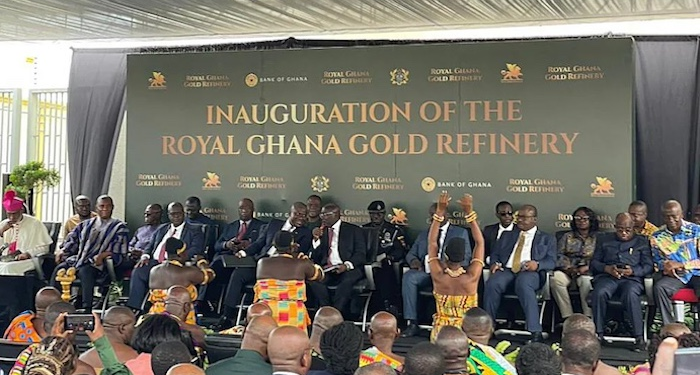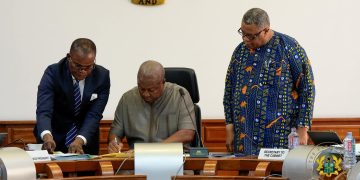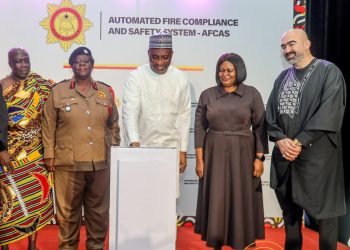1. From the late 15th century to the end of the 16th century, some historical studies estimate that the area that became known as Ghana supplied roughly 30% of the world’s traded gold.
2. Today, Ghana may supply less than 3% of the world’s traded gold, but that is still enough to make it Africa’s largest producer of the shiny commodity.
3. Despite this centuries-old heritage, very few downstream gold industries exist in the country. In the last two decades, Ghana has tried to revamp the old post-independence dream of refining most of the gold produced in the country into bullion gold, a midstream value-addition strategy. Many refineries have therefore been set up by the private sector to pursue this objective.
4. Midstream value addition is challenging in every commodity sector. Unsurprisingly, these refineries have mostly failed. There are certainly ways around the blocks of midstream value addition if policymakers are willing to think and word hard enough. But as I always argue, without sound governance, policy rarely even takes off.
5. In Ghana, the situation is worsened by what I call “State enchantment”. Elaborate spectacles that not only distract attention from policy failure but also help siphon off the resources meant for policy implementation. When you look closely, you discover that there was no policy to begin with, just twisted schemes to enrich cronies.
6. In a recent essay, I detailed how state enchantment plays out in the gold refining context in Ghana. The short summary is that a state-backed refinery, Royal Ghana Gold Refinery, packaged and presented as an instrument to finally solve the problem of Ghana’s inability to add value to gold was merely an elaborate machine to enrich some shady characters. Here is a link to the essay: https://brightsimons.com/2024/08/the-strange-case-of-ghana-first-gold-refinery-its-broke-investor/
7. Look carefully at the picture below. This was taken during the launch of Royal Ghana Gold Refinery. Note the pomp and pageantry. Observe it being called “the first gold refinery in West Africa“, a blatant untruth. Ghana alone has had almost a dozen gold refineries before this one, the first one dating to the 1960s. By the time you finish reading this piece, the notion of “state enchantment” would be intuitive.
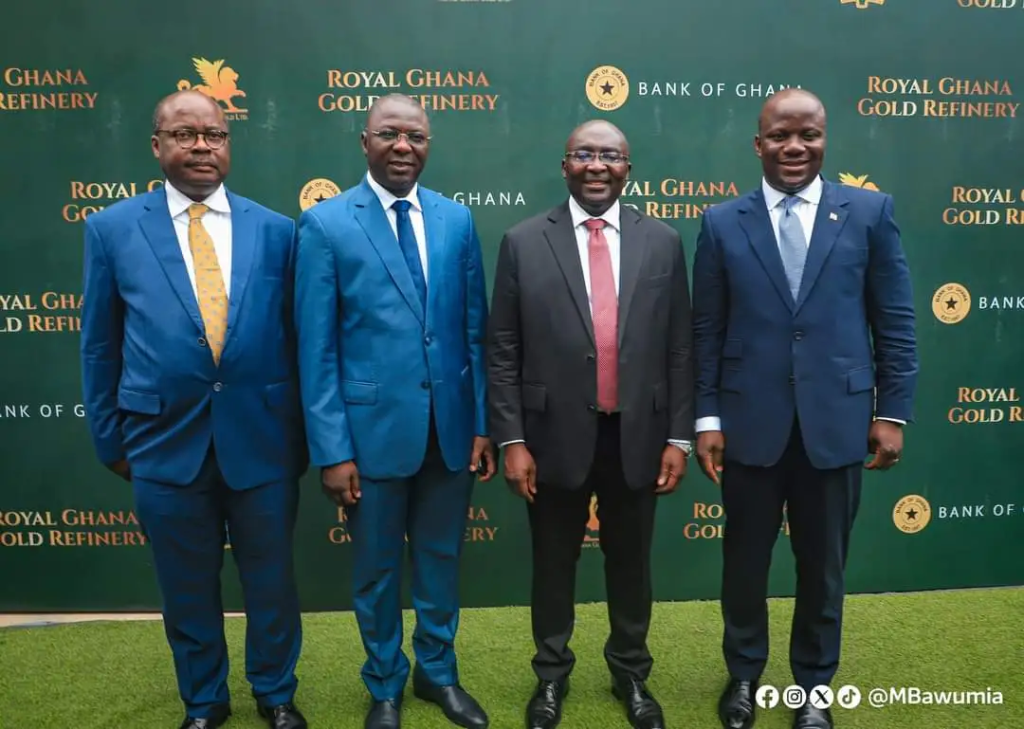
8. Before I proceed to the latest update in the Royal Ghana Gold Refinery saga, let’s rewound. Readers will recall that my central thesis was that the government could not have been telling the truth when it said that Rosy Royal, an obscure company based in Gujarat, India, owned 80% of the new refinery because we have confirmed that the Indian company has made no such investment to warrant this shareholding. Their presence could only have been to mask the true majority ownership of the refinery.
8. Apart from the worrying fact that 80% of the ownership of a state-backed refinery in which millions of dollars from the Indian government has been invested is being held by fronters for some powerful actors, the whole spectacle has damaged a central plank in the strategy to increase gold value addition in Ghana: certification. I will explain.
9. The “state enchantment” excuse given for the new gold refinery was that it will ensure that Ghana secures international certification for gold refined locally. The inability to achieve this feat all this while has prevented the big gold miners from refining gold locally. Without international certification, a miner can’t sell gold at the full price to top buyers around the world.
10. Thus, when the government launched the new gold refinery, it approached the large gold miners in Ghana through their chamber and asked them to consider locally refining some of their gold output in the new state-backed refinery in order to create the track record and conditions necessary for international certification to be possible. In fact, it even made policy aiming to eventually compel them to refine at least 20% of their total production in the new refinery.
11. A top law firm in Ghana, Bentsi-Enchill, Letsa & Ankomah, was therefore engaged to assist with due diligence on the “international investor” behind the new state-backed refinery – the Indian company, Rosy Royal, that is – whose credentials and expertise were, according to the government, necessary for international certification to be possible.
12. I can exclusively reveal today that the due diligence failed. Rosy Royal refused to cooperate with the law firm. It could not answer any of the basic questions posed. Yet, the government went ahead with the jamboree. The large gold miners have also, hence, refused to deal with the shady refinery. All of this meaning that the international certification process has now been aborted.
13. The Precious Minerals Marketing Corporation (PMMC), the anchor agency at the heart of this spectacle, has thus far refused to explain these circumstances to the mining industry. Its supervising ministry is likewise unbothered. And, of course, the Bank of Ghana, which is using precious public funds to buy gold for its reserves from local sources, and is thus most vested in international certification for local refiners, since any doubt about the provenance of the gold it buys would affect the value of the stock, won’t answer to these charges.
14. Since the government insists that the new state-backed refinery is worth $100 million, we are now in a situation where no one can explain who exactly is holding the $80 million in equity, which properly should belong to the state. Or why someone was using raw power to force Ghana’s gold miners to send their gold to a shady refinery without international certification. But it gets worse.
15. Exasperated by the refusal of the PMMC, Ministry of Land & Natural Resources, and Bank of Ghana, to answer simple questions as to who really owns the $80 million equity being fronted by Rosy Royal, we decided to send scouts and investigators to Gujarat to hunt down the mysterious owner of the company, Murtaza Sirajbha Samiwala.
16. Mr. Samiwala provided the following address to the Ghanaian authorities during the setup of the elaborate machinery that is the subject of our ongoing investigations: 601/602 Juni Bahumal. This is supposed to be an apartment in Nanpura, in the Surat City region of India.
17. The due diligence on Mr. Murtaza Samiwala and Rosy Royal would have been the responsibility of Ghartey & Ghartey, a law firm in Accra, whose principal in relation to these matters is none other than the President of the Ghana Bar Association, no less. In her capacity as a Director of Royal Ghana Gold Refinery, she has additional responsibilities to be sure about the shareholders of the company. Even if most of the routine filings appear to have been the responsibility of a certain Ms. Eva Okyere at the same law firm.
18. Imagine then the horror of our investigators when we failed to trace Mr. Samiwala in Nanpura! There is definitely an area called Bahumali in Nanpura. It even has a large well-known building of the same name. What simply doesn’t exist is a street called “Juni Bahumal”. Nor a building in the said Juni Bahumal with apartments numbered 601 and 602, in which, happily esconced, is a multimillionaire capable of blessing a West African country with a gold refinery. Our inquiries with the Gujarat Chief Postmaster General’s office confirmed our fears: the address is shady!
19. There can be only one inference from these findings: Rosy Royal and its principals knew full well that they were merely fronting. That is why they refused to cooperate with Bentsi-Enchill, the law firm tasked to do the industry due diligence, and provided untraceable address information for their key principals to the Ghanaian regulatory authorities. They aimed to minimise their risk exposure should some nosy investigator like this author come snooping around.
20. Having hit a dead-end in our Indian expeditions, all our travails notwithstanding, we have refocused on the Ghana front. Our interconnecting research, advocacy, and solution-searching commitments around development finance governance and supply chain governance find perfect expression and convergence in this hunt. We don’t need to uncover who is hiding behind the ghost investor in Ghana’s only state-backed gold refinery to siphon off $80 million in value to affirm progress in our work. We believe that we have shown enough for the bevy of actors in the aid and development finance space to take seriously our longstanding demand that Civil Society (CSO) actors become an integral part of the governance of all development projects in Africa.
Source: brightsimons.com



